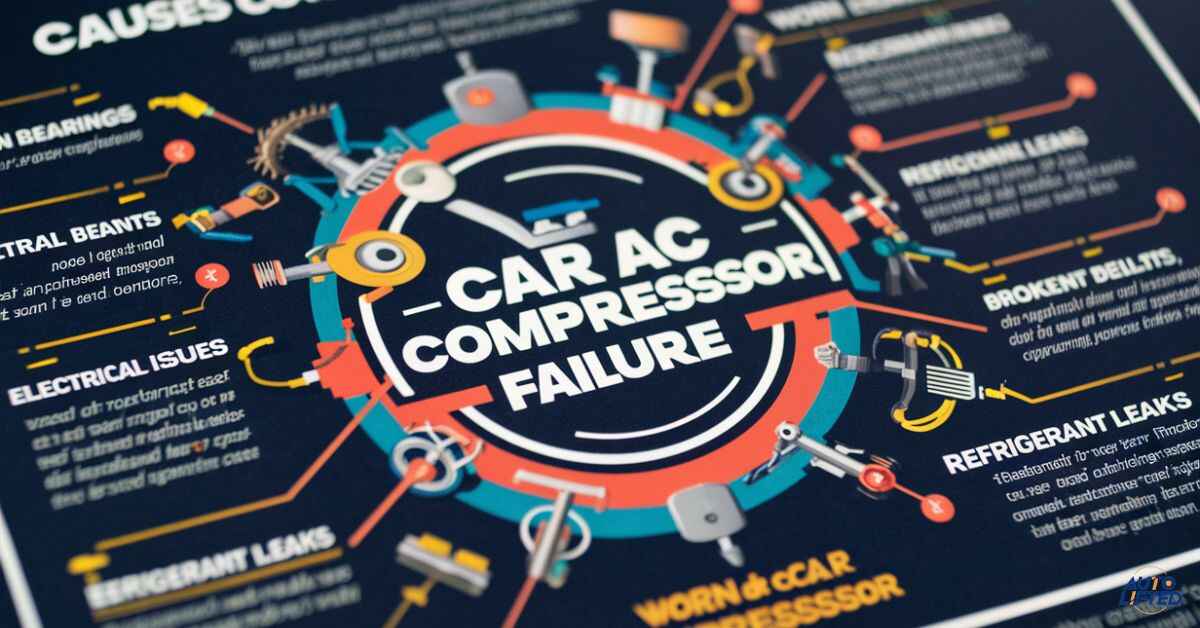Beat the heat this summer, Few things are worse than cranking up your car’s AC only to be blasted with hot air. Don’t sweat it – we’re uncovering the common culprits behind AC compressor failure. Your car’s AC compressor is a vital component that circulates refrigerant through the system. When it fails, your cool comfort comes to a screeching halt. This guide dives into the top reasons your compressor might be calling it quits.
Main Causes of AC Compressor Failure
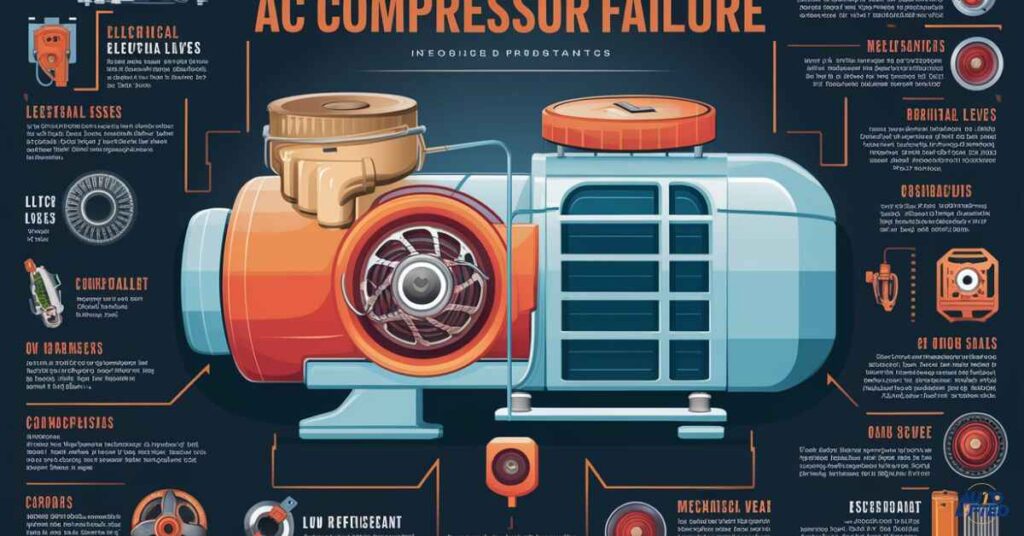
Refrigerant Leaks
One of the primary causes of AC compressor failure is a refrigerant leak somewhere in the system. Low refrigerant levels put immense stress on the compressor, forcing it to work harder to circulate the diminished supply.
Read This Blog:
How To Wash Car Engine
Signs of a potential refrigerant leak include:
- Hissing or bubbling sounds near the AC components
- Visible refrigerant around connections and lines
- Persistent lack of cooling ability
Even a small leak can quickly deplete refrigerant levels and overwork the car AC compressor, leading to premature failure.
Uncleaned Condenser
An uncleaned condenser can significantly impair your car’s AC system. Over time, dust, dirt, and debris accumulate on the condenser coils, obstructing the airflow. This blockage forces the AC system to work harder to cool the air, increasing the strain on the compressor. The added stress can cause the compressor to overheat and eventually fail. Regular cleaning and maintenance of the condenser are essential to prevent this issue and ensure the longevity and efficiency of your car’s air conditioning system.
Insufficient Oil Lubrication
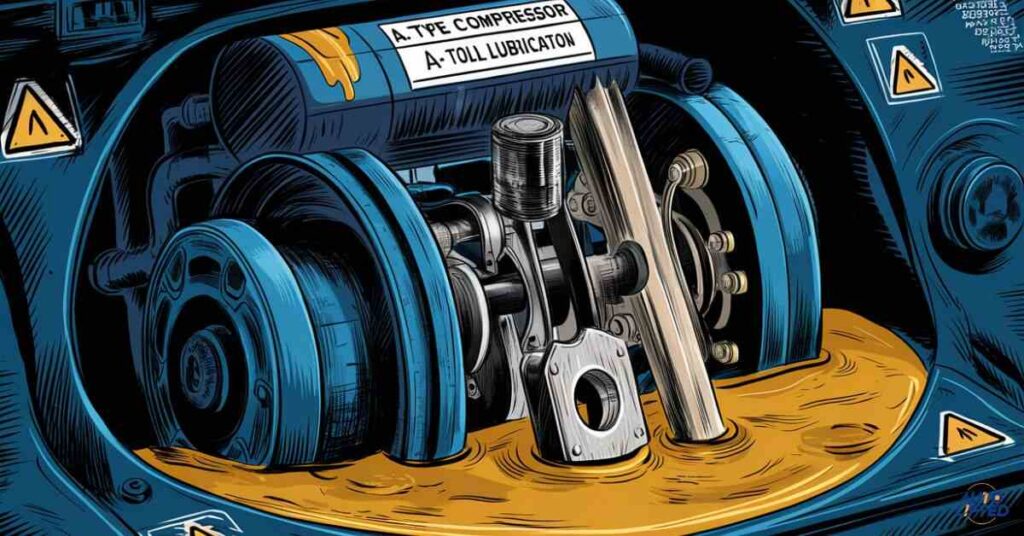
Insufficient oil lubrication is a critical factor in AC compressor failure. The compressor relies on adequate oil levels to minimize friction and heat during operation. Without proper lubrication, the compressor’s internal components can experience excessive wear and tear, leading to overheating and eventual breakdown. Regularly checking and maintaining the oil levels in your car’s AC system is essential to prevent compressor damage and ensure smooth, efficient cooling performance.
Mechanical Wear and Tear

Mechanical wear and tear is a common cause of AC compressor failure. Over time, the internal components of the compressor, such as bearings, pistons, and valves, can deteriorate due to constant use. This gradual degradation leads to decreased efficiency, increased noise, and eventually, complete compressor failure. Regular maintenance and timely replacement of worn parts are crucial to prolonging the life of the AC compressor and maintaining optimal cooling performance in your vehicle.
Clogged Components
For the AC system to function properly, unobstructed airflow is crucial. Clogged components like the condenser, evaporator, or other filters and vents can severely restrict airflow. This lack of ventilation causes heat to build up, potentially causing the compressor to overheat and fail.
Common sources of clogs include:
- Leaves, dirt, and debris accumulating on the condenser
- Buildup of dust and grime on the evaporator core
- Blocked cabin air filters
Proper maintenance and cleaning of these components helps prevent unnecessary strain on the compressor.
Lack of Lubrication
Just like any complex mechanical device, the car’s AC compressor requires a steady supply of lubrication to run smoothly. The compressor relies on a specific type of oil circulating through the system to reduce friction and heat buildup on its many moving parts.
If the lubricant levels drop too low or the oil becomes contaminated, the increased friction can lead to:
- Accelerated wear on pistons, valves, and seals
- Overheating and potential seizing of components
- Eventual total compressor failure
Maintaining proper lubrication levels through routine servicing is essential.
Electrical System Issues
While not as obvious as some mechanical failures, problems with the car’s electrical system can absolutely impact the AC compressor’s performance and lifespan. Issues like:
- Faulty wiring harnesses or connectors
- Blown fuses or bad relays
- Voltage fluctuations
Can all cause erratic operation and potentially damage sensitive compressor components over time through overheating or power spikes.
Other Potential Failure Points
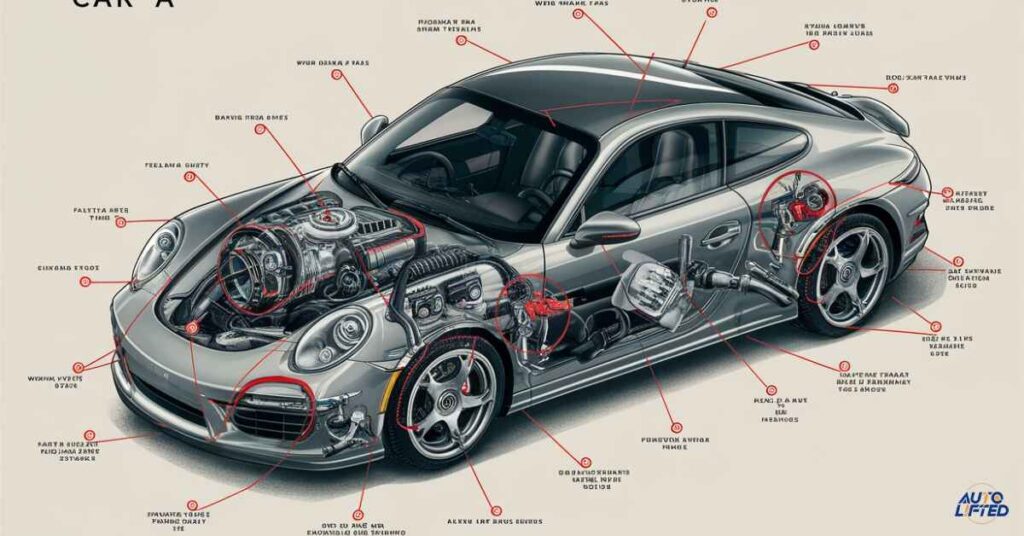
In addition to the main culprits above, a few other factors can contribute to premature car AC compressor breakdown:
- Internal Component Failure: Seized or broken valves, pistons, reed valves, and other precision compressor parts
- Contamination or Corrosion: Moisture, debris, or chemical contamination getting into the AC system
- Age and Wear: Like any hardworking component, compressors simply wear out over years of use
- Manufacturer Defects: In some cases, compressor units may have defects from the factory
Signs Your Compressor is Failing
How can you tell if your car’s AC compressor is on its way out? Watch for these common warning signs:
- Warm Air Blowing: One of the clearest symptoms – The AC can’t get cold anymore
- Loud Noises: Clunking, groaning, or rattling sounds indicating internal component failure
- Compressor Clutch Not Engaging: You may hear a click when turning on the AC but the compressor doesn’t kick on
- Visible Leaks: Wet spots or dust buildup around the AC lines and components where refrigerant or oil is escaping
- AC Cycling Issues: System turning on and off repeatedly as refrigerant levels fluctuate
If you notice these issues, it’s best to have an AC professional inspect the system before further damage occurs.
Also Read This Blog:
Why Does Buying A Car Take So Long
Preventing Compressor Failure
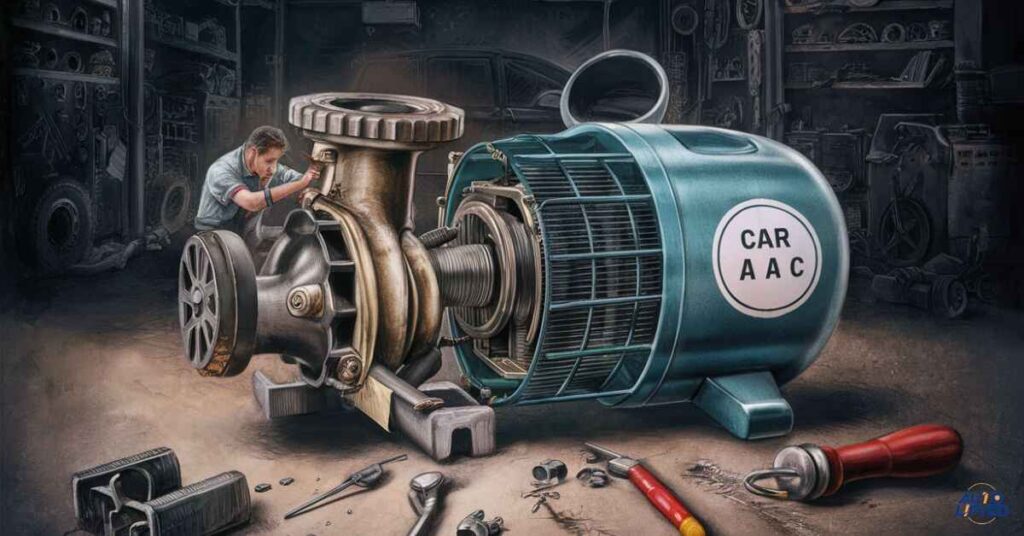
While inevitability your car’s AC compressor will eventually need replacement after years of service, there are steps you can take to help extend its lifespan:
- Keep Up with Routine Maintenance
- Recharge refrigerant levels when low
- Flush and clean the full AC system periodically
- Replace worn lines, O-rings, accumulators etc.
- Fix Leaks or Clogs Promptly
Don’t let small issues linger – refrigerant leaks and airflow blockages put excessive strain on the compressor. - Inspect Electrical Connections
Check wiring, fuses, relays and other electrical components that power the compressor for any issues. - Consider Upgrading Older Compressors
For aging, high-mileage vehicles, it may be worth installing a remanufactured or new compressor as a preventative measure.
An ounce of prevention is worth a pound of cure when it comes to car AC compressors.
Frequently Asked Question
What is the most common cause of AC compressor failure?
The most common cause of AC compressor failure is a lack of lubrication, which can lead to overheating and mechanical breakdown of the compressor components.
How does a car AC compressor get damaged?
A car AC compressor gets damaged due to issues like refrigerant leaks, clogged refrigerant lines, electrical problems, or insufficient oil lubrication, causing the compressor to overheat and fail.
What kills car AC compressor?
Contaminants such as dirt and debris, electrical failures, and low refrigerant levels can kill a car AC compressor by causing internal damage and reducing its efficiency.
What is the life expectancy of a car AC compressor?
The life expectancy of a car AC compressor typically ranges from 8 to 12 years, depending on usage, maintenance, and driving conditions.
What are signs of a weak AC compressor?
Signs of a weak AC compressor include reduced cooling efficiency, strange noises from the AC system, and noticeable leaks of refrigerant or oil.
How to diagnose compressor failure?
To diagnose compressor failure, check for abnormal noises, inspect for refrigerant leaks, and measure the compressor’s pressure output; a professional mechanic can also perform a thorough system evaluation.
Conclusion
There you have it – a comprehensive look at the most common reasons behind car AC compressor failure. From refrigerant leaks to clogged condensers, lack of lubrication to electrical gremlin, keeping an eye out for warning signs is key.
At the first sign of:
- Warm air blowing
- Strange sounds
- Fluid leaks
- Poor cooling performance
Don’t hesitate to have your vehicle’s AC system inspected by a qualified professional. Catching small issues early can prevent pricey compressor breakdowns and car discomfort down the road.
Remember, your car’s AC doesn’t just keep you comfortable – it’s also a crucial safety feature for defrosting windows and avoiding driver fatigue in hot weather. Don’t let compressor problems take the chill out of your driving experience.
